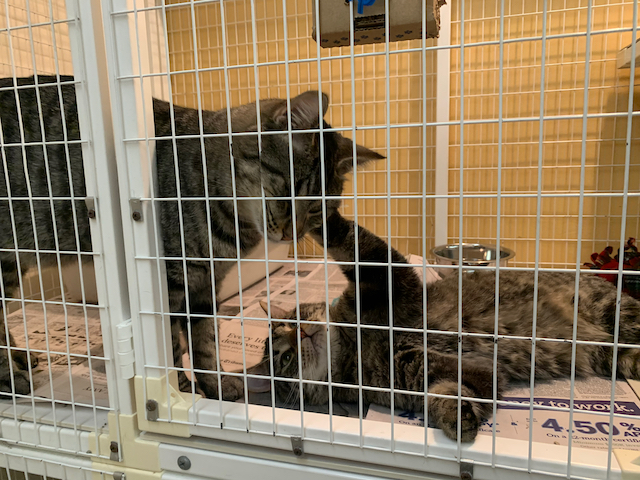Proposed bill may ban cat declawing in Illinois

Two cats await their new family at the Champaign County Humane Society. The proposed bill that amends the Humane Care for Animals Act will include cat declawing as a procedure that would be considered animal cruelty. Piper Pascarella
CHAMPAIGN - If passed, a proposed bill to ban cat declawing would fine owners up to $2,500 for declawing their cats.
Rep. Barbara Hernandez, D-Aurora introduced the bill in the Illinois State Capitol on Jan. 27.
The bill, which amends the Humane Care for Animals Act, states that “a person shall not perform surgical claw removal, declawing, or a tendonectomy on any cat or otherwise alter a cat's toes, claws, or paws to prevent or impair the normal function of the cat's toes, claws, or paws.”
“It’s something I knew that as a cat owner I had to do,” Hernandez said. “It’s horrific to see that happen to an animal.”
Hernandez said she recognized the cruelty of the procedure after seeing her friend's cat who had their claws removed.
“Their instincts are still kicking in, but their claws are no longer there,” she said. “It is more of a cruelty to this animal to declaw it than anything. It's very hurtful, it's damaging, it's cruelty to the animal, and this is a way we are trying to change that.”
As introduced, the bill would subject any person who violates the provisions to a fine of $500 for a first violation, $1,000 for a second violation and $2,500 for a third or subsequent violation.
The bill aims to limit the frequency of the cosmetic procedure, Hernandez said. Medical exceptions will be provided for therapeutic purposes regarding injuries to the toes, claws or paws.
The Illinois Humane Society brought the bill to Hernandez in late January, she said. On Jan. 31, the bill moved to the Rules Committee. Six co-sponsors have been added to the bill as of Feb. 10.
Hernandez said she hopes to bring in a specialist to talk with the Rules Committee about the consequences and pain the operation poses to the animal.
More than 20 countries, including England, France, Germany, Spain and Australia, have banned cat declawing, according to PetMD.
The procedure has also been banned in many major U.S. cities, including Austin, San Francisco, Denver and Los Angeles, according to A Humane World, a blog of the Humane Society of the United States.
In the U.S., New York was the first state to ban the procedure in 2019, followed by Maryland in 2022.
Numerous veterinary agencies have advised against cat declawing, including the American Veterinary Medicine Association, as well as many animal rights advocate groups due to its painful procedure.
The procedure involves general anesthesia and amputates the third digit of the cat's toe, said Gene Pavlovsky, the Medical Director at Veterinary Medicine South Clinic and Instructor of Primary Care at the University of Illinois’ department of Veterinary Clinical Medicine.
“An inability to use the claws changes the natural way that a cat might exercise or display their preferred methods of sharpening their claws,” Pavlovsky said.
Research has suggested that long-term pain has been associated with the amputation, including phantom limb pain – the sensation of pain in the presence of an amputee's missing limb – if the procedure is done incorrectly, Pavlovsky said.
“All of these are potential complications with the procedure and if this is done solely for the reason of preventing scratching or destruction of belongings or furniture, then it becomes an elective procedure that is not medically justified, especially in the presence of curbing the inappropriate scratching behavior,” Pavlovsky said.
There are many ways to work around some of the issues presented by a cat’s claws, Pavlovsky said, including nail caps, scratching posts, deterring them away from furniture through smells or tapes and nail services.
Maggie Figgins, a cat owner from Aurora, Illinois, and a member of the Humane Society of Aurora and Fox Valley Board of Directors, said she sees the difference in behavior between declawed and non-declawed cats.
“As an organization, we have seen it a few times where a cat has some hostility because they don’t have their claws to defend themselves,” Higgins said.
Higgins grew up with a declawed cat, but after learning more from experts about the procedure, she has taken a stand against cat declawing. She now lives with her non-declawed orange cat, Penny, and said she supports the bill against cat declawing.

